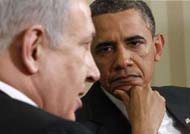
This week, Palestinians made headlines in local and international news, first for the events on May 15 marking the 63rd anniversary of Al Nakba and later at the diplomatic level after US President Barack Obama’s policy speech on the region on May 19.
While Palestinians were not highly impressed with President Obama’s speech on developments in the Arab region, there were certain points that could be taken as positive. For one, Obama specifically mentioned a Palestinian state within the 1967 borders, something Israel is clearly opposed to. “The borders of Israel and Palestine should be based on the 1967 lines with mutually agreed swaps, so that secure and recognized borders are established for both states,” the President said. “The Palestinian people must have the right to govern themselves, and reach their potential, in a sovereign and contiguous state.”
Unfortunately, Obama did not deviate much from the traditional US position on Palestinian-Israeli peace, first and foremost pledging yet again the United States’ unwavering support for Israel and its safeguarding of Israeli security. This includes a demilitarized Palestinian state, he said, with issues such as refugees and settlements to be left for final status negotiations. He did, however, admit that the “status quo was unsustainable” and that “Israel must act boldly to advance a lasting peace.”
While he did say that peace could not be achieved with “permanent occupation” Obama was clear to reiterate the “dream of a Jewish and democratic state.” In the same vein, he shot down Palestinian plans to call on the UN to recognize Palestine. “Symbolic actions to isolate Israel at the United Nations in September won't create an independent state.”
Reactions were immediate. Israeli Prime Minister Benjamin Netanyahu, who met with Obama on May 20, a day after the president’s speech, made it clear that Israel would not withdraw to the 1967 borders, which he called “indefensible.” While the two continued to reiterate the close bond between their countries and their “unshakeable friendship” tensions were clear between them. Netanyahu also said the right of return of Palestinian refugees would never be realized. In a line he has used before, the Israeli premier also told Obama that President Mahmoud Abbas would have to choose between reconciliation with Hamas and peace with Israel.
While Netanyahu claimed that he “wants peace,” he said it would have to be one that is “genuine, that will hold, that will endure", saying the only peace that will be durable is one that is based on reality as it stands, a clear reference to West Bank settlements.
The Israeli premier continued that the Palestinians “need to accept this,” and take into account demographic changes that have taken place in the past decades.
On May 21, presidential advisor said the Palestinians would continue to pursue their bid for statehood at the UN in September in spite of Obama’s clear lack of support for the move. Furthermore, PLO Executive Committee member Saeb Erekat slammed Netanyahu’s notion of peace. “I don’t think we can talk about a peace process with a man who says the 1967 lines are an illusion, that Jerusalem will be the capital of Israel, undivided, and who does not want a single (Palestinian) refugee to go back,” he said. “What is left to negotiate over?”
On the same day of the speech, Hamas spokesperson Sami Abu Zuhri said Netanyahu’s statements proved that “negotiations with Israel were useless and it would be a mistake to continue to count on reaching a compromise."
President Mahmoud Abbas dismissed Netanyahu’s comments as well. "Netanyahu's position is an official rejection of Mr. Obama's initiative, of international legitimacy and of international law," he said, also on May 20.
On the same day as Obama’s speech, Israel ratified the construction of 1,500 new settlement units in Jerusalem. The new houses will be built in Har Homa and Pisgat Ze’ev, both build on occupied Palestinian land. On May 18, also in Jerusalem, Israeli authorities closed the Ibn Qudaameh mosque in the Wadi Joz neighborhood, claiming it was being used as a Hamas headquarters. Police forces broke into the mosque, confiscating several items such as banners and microphones before arresting two men who were at the mosque.
On May 15, Palestinians everywhere commemorated Al Nakba, the Palestinian catastrophe of 1948 during which 800,000 Palestinians were made refugees. This year, thousands of people marched on the borders with Israel, with dozens crossing the border into the occupied Golan Heights of Syria. Marches and protests also took place in the Lebanese border town of Maron Al Ras where 10 protesters were killed by the Israeli army and dozens more injured. In Majdal Shams in the Golan Heights, two people were killed while crossing the border. Israel later entered Majdal Shams and arrested and deported the “infiltrators”, mostly Palestinian refugees. Protests and clashes also took place at the Erez Crossing into Gaza and Qalandiya checkpoint into Jerusalem. Furthermore, thousands of Palestinians participated in marches to commemorate the catastrophe in Ramallah, Hebron, Bethlehem and throughout the West Bank.
President Abbas called for three days of mourning over the deaths of those killed during the Nakba protests with official agencies flying the Palestinian flag at half-mast.
In local news, on May 17, the cabinet decided to postpone local elections scheduled for July 9 until October 11. The postponement, the cabinet said, was in order to allow the participation of Gaza following the recent reconciliation between Hamas and Fateh. The two sides are still in the process of forming a transitional government, which is supposed to be formed within the coming week. So far names have been nominated for the post of prime minister but no final decision has been made.
Finally, after a two week delay, Israel released the Palestinian tax revenues it withheld after the reconciliation deal between Hamas and Fateh on claims that it did not want to transfer money to Hamas. However, after international pressure, the $105 million funds were transferred on May 16, which are largely spent on civil servant salaries.







